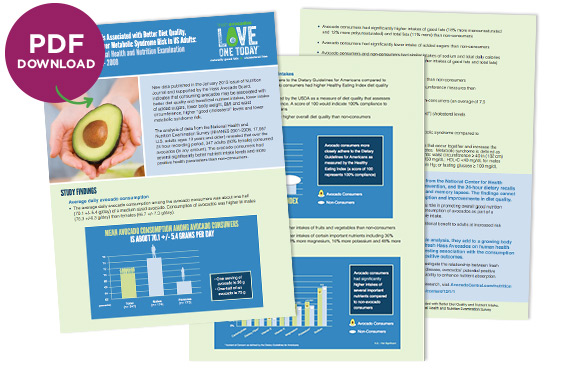Study Overview
Data published in the January 2013 issue of Nutrition Journal and supported by the Hass Avocado Board, indicates that consuming avocados may be associated with better diet quality and beneficial nutrient intakes, lower intake of added sugars, lower body weight, BMI and waist circumference, higher “good cholesterol” levels and lower metabolic syndrome risk. The analysis of data from the National Health and Nutrition Examination Survey (NHANES 2001-2008, 17,567 U.S. adults ages 19 years and older) revealed that over the 24 hour recording period, 347 adults (50% female) consumed avocados (in any amount). The avocado consumers had several significantly better nutrient intake levels and more positive health parameters than non-consumers.
Published: Nutrition Journal
Study funded by Hass Avocado Board
Category: Cardiovascular Health, Healthy Living at Every Age, Type 2 Diabetes, Weight Management
Download Scientific Study PDF
Read the Press Release
See Published Study
Key Findings & Takeaways
Avocado consumers more closely adhere to the Dietary Guidelines for Americans compared to those who don’t eat avocados; avocado consumers had higher Healthy Eating Index diet quality scores than non-consumers.
Avocado consumers had significantly lower BMI values than non-consumers.
Avocado consumers had significantly smaller waist circumference measures than non-consumers (an average of 4 cm smaller).
Avocado consumers weighed significantly less than non-consumers (an average of 7.5 pounds less).
Avocado consumers had significantly higher HDL (“good”) cholesterol levels.
Avocado consumers had a 50% lower odds ratio for metabolic syndrome compared to non-consumers.
The average daily avocado consumption among the avocado consumers was about one half (70.1 +/- 5.4 g/day) of a medium-sized avocado. Consumption of avocados was higher in males (75.3 +/-6.3 g/day) than females (66.7 +/- 7.3 g/day).
CONCLUSION:
These findings are based on NHANES survey data from the National Center for Health Statistics of the Centers for Disease Control and Prevention, and the 24-hour dietary recalls may be inaccurate and biased due to misreporting and memory lapses. The findings cannot provide causal evidence between avocado consumption and improvements in diet quality.
Despite the limitations of this study, avocados may have a role in promoting overall good nutrition and diet quality. Health professionals can recommend consumption of avocados as part of a healthful diet that focuses on increased fruit and vegetable intake. Incorporating avocados into a healthy diet may be of additional benefit to adults at increased risk for metabolic disease risk factors.

Hass Avocado Board Supports Nutrition Research
The Hass Avocado Board (HAB) is a promotion, research and information organization under supervision of the United States Department of Agriculture. HAB has a science research pipeline of ongoing clinical studies investigating the relationship between fresh avocado consumption and weight management and risk factors for cardiovascular disease and diabetes. And, based on their nutrition and phytochemical components, emerging research suggests that avocados may play benefit many emerging areas, including skin, eye, joint and cellular health.
Resource: Fulgoni VL, Dreher M and Davenport A. Avocado consumption is associated with better diet quality and nutrient intake, and lower metabolic syndrome risk in US adults: results from the National Health and Nutrition Examination Survey (NHANES) 2001-2008. Nutr J. 2013 Jan 2;12:1.





